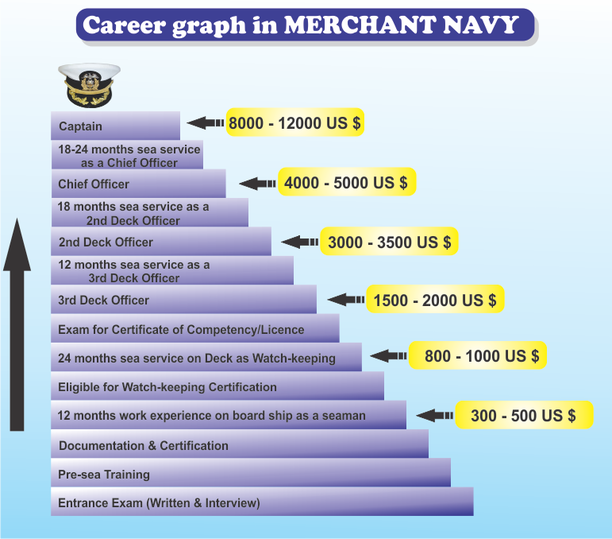
Joining the maritime industry is a dream for many, and understanding the merchant navy qualification is the first step towards achieving this dream. With sea routes being a vital part of global trade, the demand for skilled professionals in the merchant navy continues to rise.
Whether you’re aiming to become a deck officer, marine engineer, or navigation expert, the right qualifications are crucial. Starting with a clear understanding of educational requirements, certifications, and physical standards helps pave the way for success in this field. The merchant navy qualification determines your eligibility and influences your career path within the sector.
Educational Requirements for Merchant Navy Qualification
The most fundamental aspect of merchant navy qualification is your educational background. Students who have completed their 10+2 education with Physics, Chemistry, and Mathematics (PCM) are eligible to apply for various courses. Some programs also consider English as a mandatory subject. Aspiring officers must usually score a minimum aggregate percentage, typically around 60%, to be eligible. This educational base is essential for understanding the technicalities of life at sea.
Engineering candidates looking to join as marine engineers must hold a degree in mechanical, marine, or naval architecture from a recognized university. Those who wish to join at a lower rank can opt for GP (General Purpose) rating courses. These courses provide the basic training required and are essential parts of merchant navy qualification.
Age and Physical Fitness Criteria
Another key requirement in the merchant navy qualification is age and physical fitness. Generally, the minimum age for most courses is 17 years, while the upper age limit may vary from 25 to 28 years depending on the training program. Medical fitness is non-negotiable, as seafaring involves long working hours, physical challenges, and often adverse weather conditions. Candidates are expected to have good eyesight—an uncorrected vision of 6/6 is usually the standard for deck officers.
A thorough medical test approved by the Directorate General of Shipping is mandatory. Mental fitness is equally important, and any signs of psychological imbalance can disqualify a candidate. These standards ensure that only those who are physically and mentally prepared are allowed to pursue a career in the merchant navy.
STCW Courses and Certifications
Basic training under the STCW (Standards of Training, Certification, and Watchkeeping) is a critical component of merchant navy qualification. These include four mandatory courses: Personal Survival Techniques, Fire Prevention and Fire Fighting, Elementary First Aid, and Personal Safety and Social Responsibilities. Without these certifications, one cannot be deemed ready for work on international ships.
The STCW courses are often completed during the pre-sea training period and are compulsory for anyone who wants to start their sea career. These certifications are also periodically updated, ensuring that professionals stay aligned with international maritime safety standards. Therefore, obtaining and renewing STCW certifications is an ongoing part of fulfilling your merchant navy qualification.
Pre-Sea Training Requirements
Pre-sea training is the practical element of merchant navy qualification, bridging the gap between theoretical learning and onboard responsibilities. It usually lasts between 6 to 12 months and includes basic seamanship, engine room practices, safety training, and soft skills development. This training is conducted by DG Shipping-approved institutions.
During this period, students live in a simulated ship-like environment, which gives them a taste of real-life scenarios. They learn how to handle emergencies, work in teams, and follow maritime protocols. Completing this training successfully is a prerequisite for employment on ships and forms a major part of one’s merchant navy qualification.
Entrance Exams and Selection Process
Candidates aspiring to secure a merchant navy qualification must often pass competitive entrance exams like IMU-CET (Indian Maritime University Common Entrance Test). This test assesses students on subjects like Physics, Mathematics, English, and General Knowledge. Other private institutes may have their tests and interviews.
Besides written exams, personal interviews and psychometric tests are also common parts of the selection process. These aim to evaluate the candidate’s personality, decision-making ability, and leadership skills—all vital traits for a successful seafaring career. Clearing these steps not only enhances your profile but is essential to meet the full scope of merchant navy qualification.
Career Path and Promotional Scope
The journey after meeting the merchant navy qualification requirements is filled with vast career opportunities. After initial training and sea time, individuals can appear for competency exams to move up the ranks—from deck cadet to third officer, second officer, chief officer, and eventually captain. Similarly, marine engineers progress from trainee engineers to chief engineers.
These promotions are based on performance, experience, and the ability to clear higher-level exams. As you climb the ladder, both responsibilities and salaries increase significantly. Thus, fulfilling all aspects of merchant navy qualification sets the foundation for long-term career growth and professional fulfillment.

Global Opportunities After Merchant Navy Qualification
Once you hold a recognized merchant navy qualification, the global maritime world opens its doors to you. Merchant navy professionals are employed by shipping companies across the globe and often get the chance to work on international waters. These jobs not only provide financial stability but also allow professionals to travel and experience different cultures.
Having a valid qualification means you are recognized under international maritime regulations, making it easier to work with foreign companies. Many officers also switch to shore-based roles in maritime logistics, ship management, or port operations. Therefore, a robust merchant navy qualification not only ensures sea-based roles but also opens avenues for onshore careers.
Skills and Traits for a Successful Merchant Navy Career
Meeting the merchant navy qualification requirements is just the beginning. To thrive in this demanding industry, you need a specific set of skills and personality traits. Discipline, teamwork, leadership, and problem-solving abilities are essential. Strong communication skills and adaptability to different working environments also play a significant role.
Many of these qualities are developed through rigorous training and real-time sea experience. Moreover, being tech-savvy is becoming increasingly important as modern ships are equipped with advanced navigation and communication systems. Continuous learning and upskilling are essential to stay relevant and maximize the value of your merchant navy qualification.
Conclusion
To conclude, achieving the right merchant navy qualification is your gateway to a dynamic and rewarding career on the high seas. It involves meeting educational standards, physical fitness, completing STCW courses, and succeeding in pre-sea and entrance training. The qualification not only allows you to begin your maritime journey but also supports your long-term growth in various roles within the shipping industry.
Institutes like SkillsStation, known for their dedicated merchant navy coaching in Dehradun, help students navigate this challenging yet fulfilling journey. For anyone aiming to succeed in this field, the foundation begins with the proper qualifications and guidance from reputed training centers, including the best merchant navy academy in Dehradun.

Pingback: Merchant Navy Recruitment Process Guide 2025 - Skills Station
Pingback: What Is Merchant Navy? High Salary, Bright Future - Skills Station